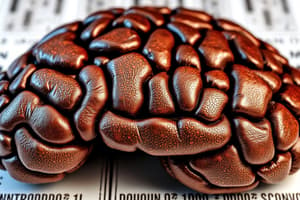Podcast
Questions and Answers
According to the multi-store model of memory, which component is responsible for maintaining information through attentional control?
According to the multi-store model of memory, which component is responsible for maintaining information through attentional control?
- Sensory Memory
- Long-Term Memory
- Short-Term Memory (correct)
- Implicit Memory
In the working memory model, which component is responsible for integrating information from long-term memory with current sensory input?
In the working memory model, which component is responsible for integrating information from long-term memory with current sensory input?
- Phonological Loop
- Visuospatial Sketchpad
- কেন্দ্রীয় ಕಾರ್ಯನಿರ್বাহী
- Episodic Buffer (correct)
What is the role of maintenance rehearsal in encoding explicit memories?
What is the role of maintenance rehearsal in encoding explicit memories?
- To retrieve information from long-term memory
- To maintain information in short-term memory for immediate use (correct)
- To transfer information directly into long-term storage without processing
- To elaborately process information for deeper understanding
What is the significance of the spacing effect in optimizing memory?
What is the significance of the spacing effect in optimizing memory?
How does the generation effect enhance memory retrieval?
How does the generation effect enhance memory retrieval?
In the context of mnemonics, how does the method of loci enhance memory?
In the context of mnemonics, how does the method of loci enhance memory?
According to decay theory, what causes the loss of memories over time?
According to decay theory, what causes the loss of memories over time?
How does proactive interference affect memory encoding?
How does proactive interference affect memory encoding?
What is the key difference between proactive and retroactive interference in memory?
What is the key difference between proactive and retroactive interference in memory?
How do similarity effects contribute to memory interference?
How do similarity effects contribute to memory interference?
What does the encoding specificity hypothesis suggest about memory retrieval?
What does the encoding specificity hypothesis suggest about memory retrieval?
How does state-dependent learning exemplify the encoding specificity hypothesis?
How does state-dependent learning exemplify the encoding specificity hypothesis?
According to the concept of transfer-appropriate processing, what primarily determines memory strength?
According to the concept of transfer-appropriate processing, what primarily determines memory strength?
What is the key distinction between episodic and semantic memory?
What is the key distinction between episodic and semantic memory?
What type of consciousness is associated with semantic memory?
What type of consciousness is associated with semantic memory?
What is the reappearance hypothesis regarding episodic memory retrieval?
What is the reappearance hypothesis regarding episodic memory retrieval?
What are the primary characteristics of flashbulb memories?
What are the primary characteristics of flashbulb memories?
How do flashbulb memories differ from everyday autobiographical memories regarding consistency and confidence?
How do flashbulb memories differ from everyday autobiographical memories regarding consistency and confidence?
What evidence suggests that flashbulb memories are not 'special' or immune to distortion?
What evidence suggests that flashbulb memories are not 'special' or immune to distortion?
According to the theory that memories are constructed, how are schemas involved in memory distortion?
According to the theory that memories are constructed, how are schemas involved in memory distortion?
What did Bartlett's (1932) 'War of the Ghosts' experiment demonstrate about the influence of schemas on memory?
What did Bartlett's (1932) 'War of the Ghosts' experiment demonstrate about the influence of schemas on memory?
How can schemas contribute to the formation of false memories?
How can schemas contribute to the formation of false memories?
What is the misattribution effect in the context of memory?
What is the misattribution effect in the context of memory?
How do leading questions contribute to the misinformation effect?
How do leading questions contribute to the misinformation effect?
What methodology do researchers use to implant false memories in individuals?
What methodology do researchers use to implant false memories in individuals?
How is memory consolidation related to the formation of false memories?
How is memory consolidation related to the formation of false memories?
What is the process of memory reconsolidation, and how does it contribute to memory distortions?
What is the process of memory reconsolidation, and how does it contribute to memory distortions?
Why might constructing our memories be considered an adaptive function, according to current psychological theory?
Why might constructing our memories be considered an adaptive function, according to current psychological theory?
Flashcards
Multi-Store Model of Memory
Multi-Store Model of Memory
The multi-store model of memory proposes sensory, short-term, and long-term memory systems.
Sensory Memory
Sensory Memory
Brief storage of sensory information.
Iconic Memory
Iconic Memory
Visual sensory memory.
Echoic Memory
Echoic Memory
Signup and view all the flashcards
Haptic Memory
Haptic Memory
Signup and view all the flashcards
Short Term Memory
Short Term Memory
Signup and view all the flashcards
Attentional Control
Attentional Control
Signup and view all the flashcards
Working Memory
Working Memory
Signup and view all the flashcards
Long Term Memory
Long Term Memory
Signup and view all the flashcards
Implicit Memory
Implicit Memory
Signup and view all the flashcards
Procedural Memory
Procedural Memory
Signup and view all the flashcards
Priming
Priming
Signup and view all the flashcards
Explicit Memory
Explicit Memory
Signup and view all the flashcards
Episodic Memory
Episodic Memory
Signup and view all the flashcards
Semantic Memory
Semantic Memory
Signup and view all the flashcards
Episodic Buffer
Episodic Buffer
Signup and view all the flashcards
Visuospatial Sketchpad
Visuospatial Sketchpad
Signup and view all the flashcards
Phonological Loop
Phonological Loop
Signup and view all the flashcards
Central Executive
Central Executive
Signup and view all the flashcards
Spacing Effect
Spacing Effect
Signup and view all the flashcards
Primacy and Recency Effects
Primacy and Recency Effects
Signup and view all the flashcards
Generation Effect
Generation Effect
Signup and view all the flashcards
Method of Loci
Method of Loci
Signup and view all the flashcards
Decay Theory
Decay Theory
Signup and view all the flashcards
Interference Theory
Interference Theory
Signup and view all the flashcards
Proactive Interference
Proactive Interference
Signup and view all the flashcards
Retroactive Interference
Retroactive Interference
Signup and view all the flashcards
Encoding Specificity
Encoding Specificity
Signup and view all the flashcards
State-Dependent Learning
State-Dependent Learning
Signup and view all the flashcards
External Context
External Context
Signup and view all the flashcards
Study Notes
- Robert Louis Stevenson said, “I've a grand memory for forgetting".
Multi-Store Model of Memory
- Memory contains sensory, short-term, and long-term components
- Sensory memory consists of iconic, echoic, and haptic elements
- Short-term memory involves attentional control and working memory
- Long-term memory is divided into implicit and explicit forms
- Implicit memory is non-declarative and non-conscious, including procedural and priming aspects
- Explicit memory is declarative and conscious, with episodic and semantic components
Working Memory Model
- Four components guide the process of memory
- Episodic buffer accesses information from long-term memory
- Visuospatial sketchpad helps with spatial layout
- Phonological loop counts windows
- Central executive guides the process
Encoding Explicit Memories
- Short-term memory requires maintenance rehearsal for encoding and learning
- Encoding leads to memory recall after a retention interval
Optimizing Memory
- Review work regularly in shorter sessions for the spacing effect
- Focus on key material at the beginning and end for primacy and recency effects
- Link new information to existing knowledge for depth of processing
Deep Encoding
- Deep encoding leads to better retrieval
- Self-reference effect is linked to identity.
- Memory is better when adjectives are used to describe you vs. common words (Leshikar et al., 2015)
- Generation effect involves active rehearsal
- Memory is better when generating words (Norman et al., 1978)
Mnemonics
- Mnemonics aid memory
- Method of Loci is also known as Memory Palace and Technique
- Mnemonics involve choosing a familiar location and imagining moving through it
- This associates items to remember within places in the space, creating a "map" of new information
Forgetting
- Decay Theory explains that memories are lost over time due to disuse
- Interference theory suggests interference is responsible for forgetting
- Encoded memories are labile and need consolidation into stable long-term memories
- Pre-consolidation periods make memories susceptible to disruption from interfering information
Interference Effects
- Interference has effects on memory
- Proactive interference occurs 'forward in time'
- Prior information interferes with encoding new memories
- Trouble learning new phone number because old number keeps popping up
- Retroactive interference occurs 'backward in time'
- Newly learned information interferes with prior encoded memories
- Trouble remembering an older password after forming a new one
Testing Interference
-
Proactive Interference Testing:
-
An experimental group learns a Mulligatawny Soup recipe then Broccoli Cheese recipe
-
A control group rests, then learns the Broccoli Cheese recipe
-
The experimental group remembers fewer ingredients
-
Prior information (Mulligatawny Soup) interferes with memory of the Broccoli Soup
-
Retroactive Interference Testing:
-
An experimental group acquires a vanilla cupcake recipe, then a cheesecake recipe
-
The control group learns a vanilla cupcake recipe and then rests
-
The experimental group remembers fewer ingredients
-
New information is interfering with memory of vanilla cupcake recipe
Similarity Effects
- Similarity to what is learned leads to mingling and interference
- Group Dessert learns a vanilla cupcake recipe, then a cheesecake recipe
- Group Dessert learns a vanilla cupcake recipe, then a Broccoli Cheese recipe
- Group Dessert remembers fewer ingredients
Optimizing Memory
- Remember Severance by cooking stew afterward rather than watching Adam Scott
Agenda
- Encoding specificity hypothesis
- Explicit memory which includes a distinction episodic and semantic memory
- Special type of episodic memory called flashbulb memories
- Distortions in memory
Encoding Specificity
- Memory retrieval is better when there is overlap with encoding
- Context is source of overlap
- Context includes internal state (e.g., mood), external environment, and processing
- Endel Tulving studied this
- Overlap determines retrieval success
State-Dependent Learning
- Internal context is state-dependent
- Alcohol dependent learning (Goodwin et al., 1969)
- Encode sober, retrieve sober group performed best
External Context
- Study looked at deep-sea divers
- Encoded and retrieved words either on land or underwater
- Participants recalled more words when the context matched
Transfer-Appropriate Processing
- The overlap between processes during encoding and retrieval determines memory strength
- Study found that shallow and deep processing lead to better match
- Context matters.
Conscious Memory
- Explicit conscious memory is divided into episodic and semantic memory
- Episodic memory is recollecting unique events within a specific time and place
- Semantic memory shares cultural knowledge and connects the self, outside time or place
Episodic vs Semantic
- Episodic memory is retrieving what, where, and when of an event
- Semantic memory is the non-retrieval of learning, just what is known
Pop Quiz
- I ordered nachos from the taco truck before my lecture last week (episodic)
- Key ingredients for nachos are cheese and tortilla chips (semantic)
- I love all type of Mexican food (semantic)
Semantic Dementia
- Semantic memory in the brain: Semantic dementia
- Semantic dementia affects temporal poles
- It is early on in disease
- The disease relatively spares episodic memory tasks
- Impaired at word naming and picture matching tasks (semantic memory)
- Irish et al., 2016 studied visual matching in patients
Episodic Memory
- Episodic memory is located in the hippocampus
- Damage to the hippocampus impairs episodic memory
- Patients cannot copy images after a delay
- Semantic memory is preserved
- Patients show normal facts and general knowledge
- Vargha-Khadem et al., 1997 studied patients
Types of Consciousness
- Memory retrieval engages types of consciousness
- Anoetic consciousness is implicit memory with no awareness or personal engagement
- Noetic consciousness is semantic memory with awareness with no personal engagement
- Autonoetic consciousness is episodic memory with awareness and personal engagement ("Mental time travel")
Reappearance Hypothesis
- Episodic memory trace is recalled the same way at each retrieval
- It is reproduced, not reconstructed
- Clinical observations show recurrent memories are unchanged from the original event, in cases like PTSD
- Involuntary memories come to mind with no retrieval attempt; often emotional and repetitive
- Suggestion that memories reappear for highly emotional memories
Flashbulb Memories
- Flashbulb memories is a special type of memory
- Form for form events that are:
- Emotionally arousing
- Surprising or shocking
- Important to the self and have consequence
- Examples
- COVID lock down
- The Queen dies
- Thought to be supported by special mechanisms which lead to repetitive detail to recall, resistant to forgetting (Brown & Kulik, 1977)
Are Flashbulb Memories special?
- Participants recalled two memories in detail
- 9/11 (flashbulb event)
- everyday autobiographical event
- I was wearing a Hawaiian shirt because I was celebrating a birthday when the phone rang
- Scored the details used to describe the memories
- Collected ratings of memory vividness, held belief and confidence
- Talarico & Rubin, 2003
- Recall Scored detailed descriptions across retrievals -Details didn't change over time (consistent details) -Details changed over time (inconsistent details)
Change over Time
- Flashbulb and everyday memories change over time
- Flashbulb memories have more confidence (belief, vividness) over time
- Talarico & Rubin, 2003 study
- Flashbulb memories change
- Flashbulb event: The 1997 verdict for the O.J. Simpson murder trial
- Participants recalled the verdict, rated emotional reaction
- Initial review, after 15 months things had changed with 50% recollections changed, 32 months 70% recollections changed
Flashbulb Memories pt. 2
- Schmolk & Squire 2000 shows there can be a 40% major distortions of memories
- Flashbulb memories: Do not reappear
- Flashbulb memories are not recurrent recordings of events
- Flashbulb memories change over time and are not resistant to memory distortion, even if memory feels strong
- Distinction between subjective and objective memory
- Must accept the theory that memories are reconstructed
Distortion
- Memory retrieval involves constructing our memories
- Constructing memories means these memories are susceptible to distortion
- Two examples
- Use general knowledge and semantic memory (schemas) to infer the way things "must have been"
- Insert false information into the constructed memory, affecting later retrieval
Schemas
- Schemas (semantic memory) distort memories
- Schemas organize and categorize information, provide expectations about how things should occur
- Bartlett (1932): The War of Ghosts experiments
- Content: young men hunting seals in a river with unfamiliar supernatural details
- Did not match Western folk story structure (schema)
- Examined how the story changed with repeated retrievals
Ghost Experiment
- Participants remembered a simplified version of the story and became more conventional with repeated retrievals
- Omissions and alterations to match Western schema
- Excluded uncommon details; "a black thing rushed out of his mouth"
- Changed uncommon activities to conventional activities, according to their schemas of how the world works such as hunting seals became fishing
- Schemas lead to false memories
- Study scenes associated with schema-consistent items removed
- Classroom without a chalkboard
- Auditory word recognition test for items from the scenes
- Studied items: "Desks"
- Schema-related lures: "Chalkboard"
- Non-schema-related items: "Ball"
- Miller and Gazzaniga, 1998
False Memories
- Schemas can connect autobiographical memories
- Other false memory effects can include
- Misattribution which causes a familiar feeling to lead to incorrect associations
- Misinformation that can add Details to memories during retrieval
Misattribution and Misinformation
- Retrieving familiar information from the wrong source (place) causes misattribution
- Failure in source monitoring (not remembering where or when accurately)
- Leading questions can cause false memory formation (Loftus and Palmer (1974))
- The misinformation effect can cause questions to be phrased in a leading manner that affect recollection
Implanting Memories
- Participants recalled childhood experiences recounted by their parents over three experimental sessions
- A false memory was added to the list of experiences by a experimenter suggesting an An overnight stay in a hospital
- In the 3rd session 20% of people had a false memory this event (Hyman et al., 1995)
- Memories consolidation explains false memories
- Experiences are encoded and then consolidated into long-term memory trace
- The formation of stable cortical representations of memories are active
- Memories that are retrieved are reconsolidated
- Retrieval shapes a memory trace
- Adaptive angle: Why we have a constructed memory
Studying That Suits You
Use AI to generate personalized quizzes and flashcards to suit your learning preferences.




